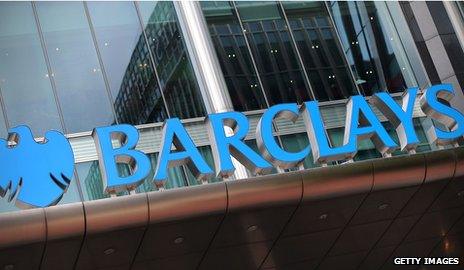Another FSA probe at Barclays
- Published
- comments

Barclays is being investigated by the Financial Services Authority over whether it disclosed in a comprehensive and timely fashion all the fees it paid to advisors when raising more than £5bn of emergency capital from middle eastern investors at the end of 2008.
The FSA's probe also relates to a debt sale by Barclays the following year.
In today's interim results from Barclays, it disclosed that four current and former staff, including the finance director Chris Lucas, are being investigated by the City watchdog over whether they told shareholders enough about fees payable on unspecified commercial deals.
I have learned that these deals include the funds raised from investors in Qatar and Abu Dhabi at the end of 2008, which allowed Barclays to avoid being semi-nationalised along with Royal Bank of Scotland and Lloyds.
My sources at Barclays insist there was no deliberate intent to hide fees or mislead other investors about what was paid to advisors on these transactions. They say that if there was a breach of the FSA's rules, it was an oversight.
The FSA's investigation is relatively new, and there is some bemusement at the bank about why it did not take place earlier.
The money raised from Qatar and Abu Dhabi was controversial, because some of Barclays' other investors felt that the middle-eastern investors were offered terms for their investments that were too generous.
The other uncomfortable disclosure in Barclays' results is that it is taking a charge of £450m to cover the costs of providing redress to small businesses that were sold inappropriate financial products called swaps. This is a bigger sum than some had expected (and see this previous post).
All that said, the big message of the results for the first six months of the year is that - although Barclays is in the uncomfortable position of looking for a new chief executive and chairman, because of the damage to its reputation caused by the LIBOR scandal - its profits are holding up better than some rivals around the world.
Stripping out the increase in what it would cost Barclays to buy back its own debt, which arguably eccentric accounting rules force all banks to incur, profits before tax rose 13% to £4.2bn - which remains significantly below Barclays' targets but is moving in the right direction.
What is particularly striking is the resilient performance of the investment bank. This has prompted the outgoing chairman Marcus Agius to make comments implying the board has no intention of breaking the bank up, which is what some critics would like.
Barclays' balance sheet has become stronger in most respects: it is holding more cash; lending is moving near to balance with dependable deposits; but there has been a tiny reduction in the ratio of loss-absorbing equity capital to loans and investments.
As for Barclays' vulnerability to the crisis in the eurozone, its exposure to the debt of the financially-stretched governments of Spain, Italy, Portugal, Ireland, Greece and Cyprus fell by more than a fifth in the first half of the year to £5.6bn. Barclays holds £2.2bn of Spanish government debt, and £2.6bn of Italian government bonds.
That said, Barclays has made £49.6bn of retail and corporate loans in Spain, Italy and Portugal - so there could be an increase in its bad debt charge if the weakening of these economies intensifies.
In this latest period, Barclays' loss on debts and investments going bad across all its global operations was steady, at £1.8bn.
Like Lloyds' results yesterday, Barclays figures point to a British economy that is stagnating rather than shrinking violently.